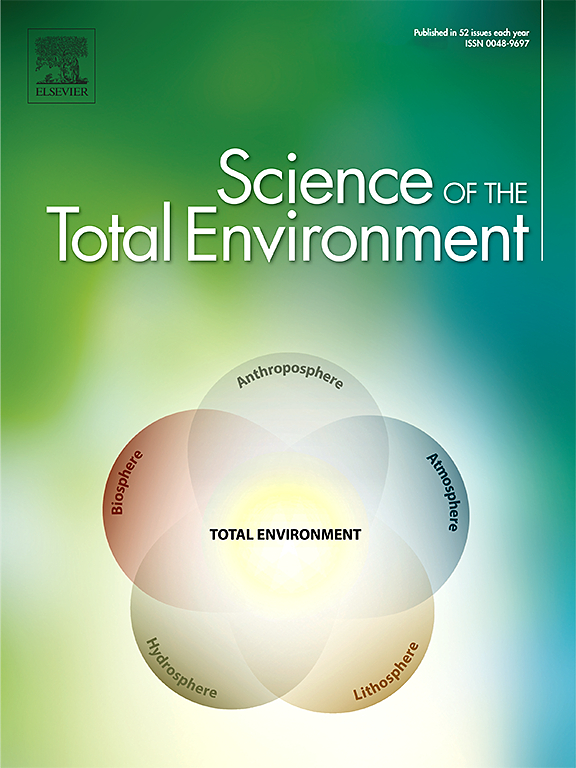弗雷泽河流域火灾对淡水质量的累积影响及其对萨利希海的影响
IF 8.2
1区 环境科学与生态学
Q1 ENVIRONMENTAL SCIENCES
引用次数: 0
摘要
水从陆地向海洋的运动是陆地和海洋系统之间的主要生物地球化学联系,陆地扰动可以通过它影响淡水质量和沿海海洋。野火是一种主要的陆地扰动,但其对大型淡水系统和海洋水质的影响尚未得到充分研究。由于人为压力改变了全球的火灾制度,因此更好地理解这种联系是很重要的。弗雷泽河流域有重要的野火历史,弗雷泽河对其接收萨利希海的水域有重大影响,使其成为研究火灾对从淡水到海洋水质影响的理想系统。本研究利用历史水质和火灾数据评估了野火对弗雷泽河水质的累积影响。弗雷泽河流域的野火解释了高达16.3%的水质变化,靠近主要水道的火灾对水质有直接影响,而远离主要水道的野火对水质的影响则是延迟的。对于萨利希海特别重要的水质变量,野火与河流中某些成分浓度的短期下降有关,并与几乎所有评估的水质变量浓度的延迟增加有关。这些发现对沿海海洋生产力和污染具有重要意义,并确定火灾是陆地和海洋之间生物地球化学循环的重要因素。本文章由计算机程序翻译,如有差异,请以英文原文为准。

Cumulative effects of fire in the Fraser River basin on freshwater quality and implications for the Salish Sea
The movement of water from land to the ocean serves as a major biogeochemical link between terrestrial and marine systems, through which terrestrial disturbances can impact freshwater quality and coastal oceans. Wildfire is a major terrestrial disturbance, however its influence on water quality in large freshwater systems and the ocean is understudied. As anthropogenic pressures change fire regimes globally, it is important that this connection is better understood. The Fraser River's basin has significant wildfire history, and the Fraser River has major influence on its receiving waters of the Salish Sea, making this an ideal system in which to investigate the influence of fire on water quality from freshwater to the ocean. This study assessed cumulative impacts of wildfire on Fraser River water quality using historical water quality and fire data. Wildfire in the Fraser River basin explained up to 16.3 % of variance in water quality, and fires burning closer to major waterways had immediate influence on water quality, while farther away wildfires had a delayed influence on water quality. For water quality variables of particular importance in the Salish Sea, wildfire was linked to short term decreases in the riverine concentrations of some constituents, and delayed increases in the concentrations of nearly all assessed water quality variables. These findings have implications for coastal ocean productivity and contamination, and identify fire as an important agent of biogeochemical cycling between land and ocean.
求助全文
通过发布文献求助,成功后即可免费获取论文全文。
去求助
来源期刊

Science of the Total Environment
环境科学-环境科学
CiteScore
17.60
自引率
10.20%
发文量
8726
审稿时长
2.4 months
期刊介绍:
The Science of the Total Environment is an international journal dedicated to scientific research on the environment and its interaction with humanity. It covers a wide range of disciplines and seeks to publish innovative, hypothesis-driven, and impactful research that explores the entire environment, including the atmosphere, lithosphere, hydrosphere, biosphere, and anthroposphere.
The journal's updated Aims & Scope emphasizes the importance of interdisciplinary environmental research with broad impact. Priority is given to studies that advance fundamental understanding and explore the interconnectedness of multiple environmental spheres. Field studies are preferred, while laboratory experiments must demonstrate significant methodological advancements or mechanistic insights with direct relevance to the environment.
 求助内容:
求助内容: 应助结果提醒方式:
应助结果提醒方式:


